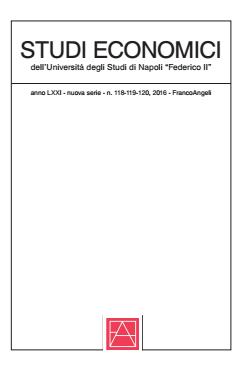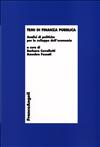
LIBRI DI AMEDEO FOSSATI


In this note, attention is focused on two essays, namely Myths and paradoxes of justice in taxation and Abstract hypotheses and historical hypotheses and on value judgements in Economic science, which are included in Luigi Einaudi’s Selected Economic Essays, recently published in English. The two essays are the most significant among the epistemological opus of Einaudi; thus, this note is devoted to discuss Einaudi’s problem of knowledge in economics.

The epistemological debate between Luigi Einaudi and Mauro Fasiani is discussed herein by considering not only the essays published in journals, but also the private letters of the two discussants, notably Fasiani’s recently discovered unsent correspondence. Revisiting the entire discussion is of considerable interest for understanding the history of economic thought, not to mention the current relevance of the arguments raised, which relate to the different perspectives by which science may be considered and to the different answers to problems such as the cognitive capability of economic science and the relationship among science, value judg ments, and economic policies. The debate allows us to infer that in those years, Einaudi did not believe the theory of public finance to be independent of economic science, concluding that the Italian tradition was essentially over. On the contrary, Fasiani believed in the autonomy of the theory of public finance, and was the last scholar still working to build a unifying design covering the entire set of public interventions in the economy.

The publication of Miti e paradossi della giustizia tributaria in 1938 originated an important epistemological debate between Einaudi and Fasiani. In Miti e paradossi, "useful’projects are considered as part of the scientific approach, and science has an interest in good governance and in the ideal economic tax, understood as tax on average or normal income. These Einaudi’s propositions deeply troubled Fasiani who still followed Einaudi’s original idea that any value judgment, expression of sentiment or precept is out of the economic science. Thus, Fasiani wrote a critical review regarding the epistemological setting of Miti e paradossi, in the form of two long letters addressed to Einaudi. However, Fasiani never sent them, because he had the concern that they could be considered disrespectful. Despite being mentioned in the correspondence Einaudi-Fasiani, such unsent letters had gone lost, but has now been found in the Archives of Turati Foundation, and are published here in Appendix. Keywords: Italian tradition in Public Finance; Mauro Fasiani, Luigi Einaudi, epistemology, economic science

Mauro Fasiani’s scholarly achievement still does not occupy its proper place in scientific debate, either in Italy or abroad. Thus, the enhancement of the scientific figure of Mauro Fasiani presents a very significant scientific interest, in order to finally put into perspective his contribution to the evolution of the theory of public finance not only in the Italian tradition in Public Finance but in the international context also. To that end the present paper is directed, within the limits that the aim is not to discuss Fasiani’s scientific thought, but only to draw it to the attention of international scholars by making known the content of his work. JEL CODE: B13, B31, H1, H12, H21, H22, H24, H25, H26, H31, H32, H42, H43, H44, H50, H89

Analisi di politiche per lo sviluppo dell'economia
cod. 365.509



Il caso della Liguria, Toscana e Marche
cod. 365.311

Il federalismo fiscale in Italia e in Europa
cod. 364.64

Attuazione della riforma al titolo V della Costituzione
cod. 365.234

cod. 380.183

cod. 361.37

The terms of the lively debate on federalism still going on in Italy are presented. Improving efficiency through fiscal federalism is certainly considered, but the dominant theme is perhaps on purely political grounds. Even if the transition process from unitary to federal state has actually started, it is not yet clear what sort of fiscal federalism is being pursued. Co-operative fiscal federalism could be an important vehicle through which northern people’s demand for local autonomy could be made compatible with the less developed economy of southern Italy. To introduce fiscal federalism, however, central government must be willing to reduce its activities. Whilst implementing any reasonable form of fiscal federalism in Italy, the central power would have to considerably change its standpoint and behaviour. In evaluating the achievements towards fiscal federalism up to now, it is possible to perceive an offer of decen-tralisation, which could be an attempt to escape autonomous pressures by building a system of relationships that actually strengthens central predominance. The ideologies of dirigism and centralism appear to be particularly exposed to the danger of using decentralisation as a means of defusing the push for autonomy: this seems to be one of the greatest impediments fiscal federalism is facing in Italy at the moment.

Elementi per un'analisi economica dell'intervento pubblico
cod. 500.11


cod. 500.21

Aspetti teorici e applicazioni al caso Italia: Iva-Irpef-oneri sociali
cod. 500.13